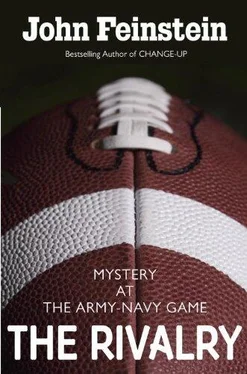The side judge shot Taylor a look. Taylor shot him a look right back. At that point Kelly, who watched impassively with his arms folded unless it appeared an Army player might be hurt, put his hand on Taylor’s shoulder.
“Easy, Doc,” he said.
Kelleher was laughing. “I don’t think I’ve ever heard Dean raise his voice except on the sidelines.”
Both teams ran almost identical offenses. Paul Johnson, the former Navy coach, was using the same option attack with Georgia Tech that had been so effective at Navy. He’d already won one ACC title with it and was closing in on another one. Army, after getting pounded by Navy’s option for years, had hired Rich Ellerson, largely because he ran a similar offense at Cal Poly.
The result was that the defenses knew the offenses well since they practiced against them all the time. When Johnson called for an option pass early in the second quarter from midfield, the Army defense was ready for it and intercepted the pass near the goal line. Every time Army tried to run a toss play for their slotbacks, Georgia Tech was ready for it.
The only score of the first half came late. Army had pinned Georgia Tech near the goal line and forced a punt. The kick was a short one, and Army kick returner Tom Knudson got it to the Tech 37. Army managed to pick up a first down but then stalled at the 21. With forty-two seconds left, field goal kicker Jay Parker hit from thirty-eight yards to make the halftime score Army 3-Georgia Tech 0.
“Not exactly an offensive fireworks display,” Kelly said as they crossed the field, heading for the locker room. When they got to the door, Kelly pointed out a middle-aged man in the back of the room.
“Bobby, take Stevie back there to Dicky,” he said. “He’ll take care of you. I’ve got to go into the training room and get to work.”
Stevie noticed that the coaches had huddled together in an office as soon as everyone piled into the room. Kelleher maneuvered him over to Dicky.
“So, finally, I get to meet a real journalist,” Dicky said as he gave Kelleher a hug. “Steve, I’m Dick Hall; it’s a pleasure to meet you.” He pointed at a table in the corner. “We’ve got snacks over there; help yourself.”
Stevie thanked Hall and scanned the piles of candy, donuts, bagels, and drinks. He had already eaten two hamburgers in addition to breakfast. But he grabbed two packages of spice drops just in case.
“Dicky’s been the equipment manager at West Point since General Thayer founded the place,” Kelleher told him.
“Liar,” Hall said. “It wasn’t until two years later.”
Thayer had founded the academy in 1802. And Hall looked to be about fifty.
“Actually, it was 1971,” Hall said, cutting Stevie a break. “Right after I got back from Vietnam.”
That, Stevie knew, made him older than fifty but younger than Sylvanus Thayer.
The coaches came back into the room and the players broke off into groups. A few minutes later, they all returned to the main locker area and Rich Ellerson came into the room.
“We told you this was going to be a defensive struggle, didn’t we?” he said. “This is exactly the game we wanted. It’s going to come down to one mistake, one play -someone making a play to win the game. Every man in this room is capable of making that play. Each and every one of you. Let’s all be ready when that moment comes, because we don’t know when it’s going to be.”
He paused and looked around the room. “There’s no one who has more respect for Coach Johnson than I do. You guys know that. But we owe him a loss, don’t we?”
“YES, SIR!” they all answered.
“Let’s go.”
As soon as the players moved to the middle of the room to huddle up before going back outside, Stevie turned to say something to Dick Hall. But he wasn’t there. Stevie looked around the room and found Hall standing by the door. As the players walked through it, Hall gave them each a pat and called each by name, saying, “Let’s go, touch the sign.” The players all patted Hall back and reached up and touched a sign directly above the door.
As he and Kelleher followed the players out, Stevie paused to read it: NOW I LAY ME DOWN TO BLEED AWHILE BEFORE I RISE AGAIN TO FIGHT.
“What is that?” Stevie asked.
“A lot of college football teams have some sign they post above the locker room door that the players touch for luck or inspiration as they go out,” Kelleher said. “Most of them are corny things like ‘The team that plays hardest wins the most.’
“This one’s a little different. It’s an old Army saying from a long-ago battle. Dicky says it was already in place when he got here, so he doesn’t know who first posted it. But it means a lot to the players.”
Stevie could tell. There was an incredible aura in this place. The history, the tradition-it was a palpable force.
The second half of the game wasn’t much different from the first, although the offenses did finally gain some traction. Georgia Tech took the kickoff, finally got its offense in gear, and went eighty yards, culminating the drive when their huge fullback bulled into the end zone from four yards out.
“They took almost eight minutes off the clock,” Tim Kelly said as the extra point made it 7-3. “Our offense needs to give the defense some rest right now.”
It did. Trent Steelman, the Army quarterback, wasn’t all that big, but he began finding some room after a couple of good runs up the middle by fullback Tom Nottingham. Then he faked a run, dropped back, and found tight end Michael Arnott open for a twenty-two-yard pickup to the Georgia Tech 23. But the drive stalled there and Parker had to come in and try another field goal, this one from thirty-six yards out.
The kick began hooking left as it got near the goal line, causing everyone on the sidelines to lean to the right, trying to guide the ball through. Which kind of worked-the ball hit the left upright and ricocheted through the goalpost.
“Thank God,” Taylor said.
“I’m not sure he was involved,” Kelly said. “But we’ll take it.”
There was a little more than a minute left in the third quarter, and Georgia Tech led 7-6.
Stevie noticed that the wind had picked up and the temperature had dropped since kickoff, but the game was going quickly-it wasn’t even three o’clock. As the third quarter ended, the band played the Army fight song and the four thousand cadets-all of them standing-went crazy, singing so loudly that “On, brave old army team, on to the fra-aaay” echoed in Stevie’s ears.
If a team could win on heart, Army had the game locked up.
Early in the fourth quarter, with the Yellow Jackets facing third and two on their own 37, Georgia Tech coach Paul Johnson made a bold call.
Thinking Army would be looking for a run made sense, since Tech had only thrown six passes at that point. So Johnson called for a quick pass on a sideline route, figuring he’d at least get a first down and might pick up big yardage. But Army cornerback Mario Hill didn’t fall for the fake, and when the Tech quarterback threw the ball, Hill stepped in front of the intended receiver, intercepted the ball, and had nothing but open field in front of him as he raced to the end zone.
The Army sideline exploded, and Stevie noticed that even Tim Kelly unfolded his arms long enough to hug both Dean Taylor and Dick Hall. Stevie wondered if this was the one big play Coach Ellerson had talked about at halftime.
Army went for a two-point conversion to try to make the lead 14-7. Quarterback Trent Steelman took it himself-and drove right into the end zone. The band played the fight song again. The place was jumping.
But Georgia Tech hadn’t run up a 9-1 record without having dealt with some tough situations. The Yellow Jackets calmly pieced together a drive that took another seven minutes off the clock and tied the score at 14 with just under four minutes left in the game. Each team got the ball once more; neither came close to scoring.
Читать дальше












